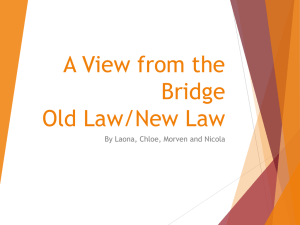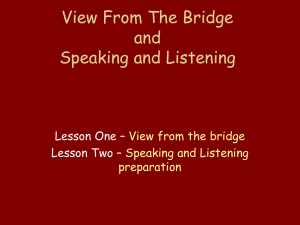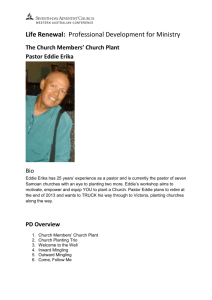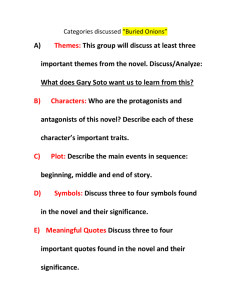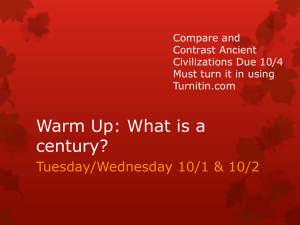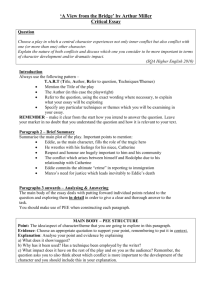A Hanging - Wiredshire
advertisement
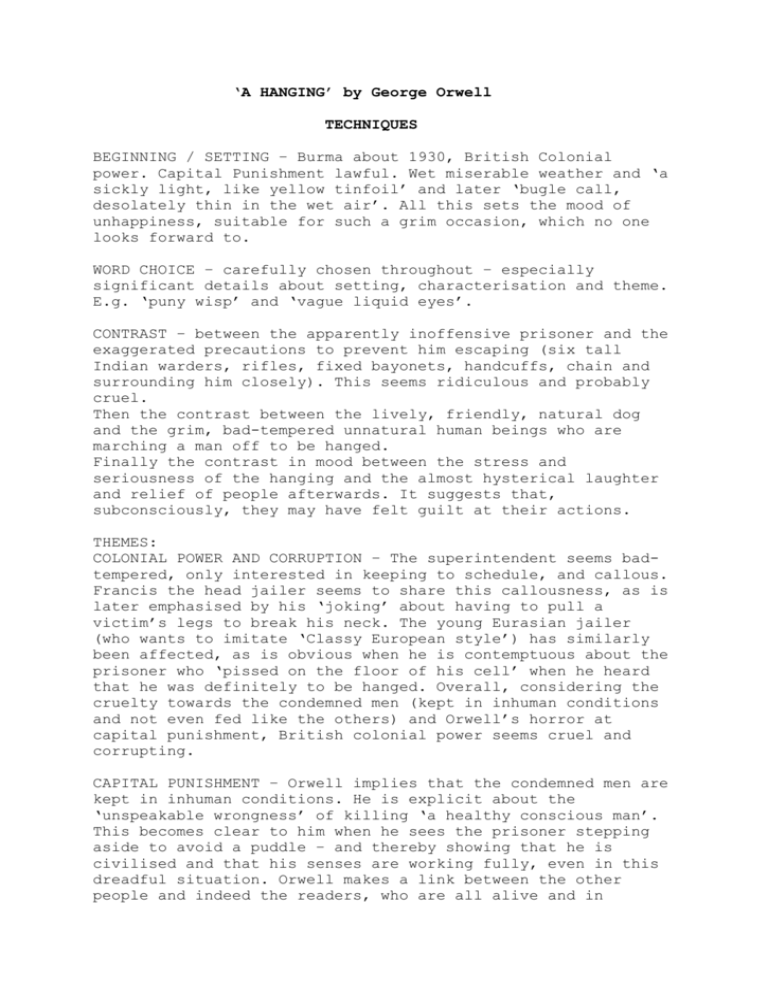
‘A HANGING’ by George Orwell TECHNIQUES BEGINNING / SETTING – Burma about 1930, British Colonial power. Capital Punishment lawful. Wet miserable weather and ‘a sickly light, like yellow tinfoil’ and later ‘bugle call, desolately thin in the wet air’. All this sets the mood of unhappiness, suitable for such a grim occasion, which no one looks forward to. WORD CHOICE – carefully chosen throughout – especially significant details about setting, characterisation and theme. E.g. ‘puny wisp’ and ‘vague liquid eyes’. CONTRAST – between the apparently inoffensive prisoner and the exaggerated precautions to prevent him escaping (six tall Indian warders, rifles, fixed bayonets, handcuffs, chain and surrounding him closely). This seems ridiculous and probably cruel. Then the contrast between the lively, friendly, natural dog and the grim, bad-tempered unnatural human beings who are marching a man off to be hanged. Finally the contrast in mood between the stress and seriousness of the hanging and the almost hysterical laughter and relief of people afterwards. It suggests that, subconsciously, they may have felt guilt at their actions. THEMES: COLONIAL POWER AND CORRUPTION – The superintendent seems badtempered, only interested in keeping to schedule, and callous. Francis the head jailer seems to share this callousness, as is later emphasised by his ‘joking’ about having to pull a victim’s legs to break his neck. The young Eurasian jailer (who wants to imitate ‘Classy European style’) has similarly been affected, as is obvious when he is contemptuous about the prisoner who ‘pissed on the floor of his cell’ when he heard that he was definitely to be hanged. Overall, considering the cruelty towards the condemned men (kept in inhuman conditions and not even fed like the others) and Orwell’s horror at capital punishment, British colonial power seems cruel and corrupting. CAPITAL PUNISHMENT – Orwell implies that the condemned men are kept in inhuman conditions. He is explicit about the ‘unspeakable wrongness’ of killing ‘a healthy conscious man’. This becomes clear to him when he sees the prisoner stepping aside to avoid a puddle – and thereby showing that he is civilised and that his senses are working fully, even in this dreadful situation. Orwell makes a link between the other people and indeed the readers, who are all alive and in possession of their senses, and the prisoner, who is just about to lose all faculties due to execution. ‘in two minutes, with a sudden snap, one of us would be gone – one mind less, one world less.’ The alliteration emphasises the brutality of the prisoner’s neck breaking; and ‘one world less’ emphasises the great injustice of destroying someone’s whole world. Overall, this is a PROTEST ESSAY. SUSPENSE – ‘We set out for the gallows.’ ‘Minutes seemed to pass.’ ‘oh, kill him quickly, get it over, stop that abominable noise!’ ANTI-CLIMAX – ‘There was a clanking noise, and then dead silence.’ ‘He was dangling with his toes pointed straight downwards, very slowly revolving, as dead as a stone.’ CHARACTERISATION – Note what has been said under ‘Colonial power’ above. In addition, the prisoner seems quite admirable under stress. He manages to walk steadily despite his situation and chants ‘Ram! Ram!’ in a way which is ‘not urgent and fearful….but…rhythmical’ The only other characters who seem to deserve any credit are the Indian warders who seem to try to support the man, and who turn ‘grey like bad coffee’ with ‘wavering’ bayonets when they are waiting for the hanging to take place. They seem more sympathetic than the others. Although Orwell thinks the whole incident horrible and wrong, he does nothing to protest at the time. Maybe he could have achieved nothing by doing so and to write about it later is a more effective form of protest. IMAGERY – there are several significant examples to note MOOD CHANGE – mentioned under Contrast. TONE – sympathetic, horrified, implied criticism, explicit criticism. ENDING – ‘We all had a drink together, native and European alike, quite amicably. The dead man was a hundred yards away.’ Racial differences are temporarily ignored because of a common mood of relief. The last sentence contrasts with the drinking, laughing crowd and provides a grim reminder of what they have actually done. In the TITLE the word ‘A’ suggests that many such hangings were carried out under this cruel colonial rule. ‘A View From The Bridge’ by Arthur Miller KEY QUOTATIONS ACT ONE Alfieri the lawyer / narrator sets the scene. ‘This is Red Hook, not Sicily.’ ‘We settle for half’ ‘run its bloody course’ 1 Eddie Carbone; niece Catherine: ‘walking wavy’ ‘you’re a baby’ cousins arriving – honour 2 Job. 17. Beatrice: ‘You gonna keep her in the house all her life?’ Eddie: ‘You’re the Madonna type.’ 3 Vinny Bolzano story – snitched on his uncle. Eddie: ‘How’s he gonna show his face?’ ‘I never figured ….that you would ever grow up.’ Beatrice: ‘I’m not mad. You’re the one is mad.’ 4 Rodolfo – high tenor – ‘Paper Doll’‘a doll that other fellows cannot steal…..flirty, flirty guys’ Eddie: be quiet – tells off Catherine – high heels Rodolfo: ‘I like sugar very much!’ 5 Beatrice and Eddie: Rodolfo – ‘heeby-jeebies’ blond, sings, not a proper man. Beatrice wants to stop his ‘campaign’. Beatrice: ‘When am I gonna be a wife again, Eddie?’ Eddie: ‘I ain’t been feeling good.’ Beatrice: ‘You gonna stand over her till she’s forty?’ 6 Eddie grumpy after Catherine and Rodolfo return from cinema. ‘bowin to his passport’ Beatrice to Catherine: ‘If it was a prince…’ ‘Don’t act like a baby….say goodbye….you gotta.’ 7 Eddie visits Alfieri. ‘he ain’t right’ not saving, high voice, dressmaking. Alfieri – do something about illegal entry? Eddie: ‘I wouldn’t do nothing about that’ Alfieri: ‘She can’t marry you, can she?’ He predicts a tragedy is inevitable but is powerless to stop it. 8 After Eddie complaining about R, Catherine – revolt – ‘Paper Doll’ dance. Boxing ‘lesson’ indicates Eddie’s anger. Marco – chair lift – warning. ACT TWO 9 Rodolfo and Catherine talking. He wants to marry her and be a citizen. Really loves her. Catherine’s feelings for Eddie. ‘He was the sweetest guy…I want him to be happy…I can’t stand it!’ ‘I know him and now I’m supposed to turn round and make a stranger out of him?’ Whisky – Eddie a bit drunk – finds C and R exiting from the bedroom: ‘Get your stuff and get out here.’ Catherine ready to go too. Eddie: ‘You ain’t goin’ nowheres.’ Kisses her on the mouth. Rodolfo (who says she will be his wife) attacks him. Eddie pins his arms and, laughing, kisses him. Catherine ‘tears at him’. Eddie: ‘You see?’ He threatens to throw the ‘submarine’ back in the water. Alfieri warns him ‘the law is nature’ Glowing Phone Booth (blue). ‘You won’t have a friend in the world !’ Eddie phones the Immigration Bureau. Tells Beatrice not to nag about sex. ‘I want my respect.’ Beatrice: ‘You kept her a baby, you wouldn’t let her go out’ Beatrice tells him Catherine and Rodolfo are getting married.’Tell her good luck.’ Catherine asks him to the wedding. Eddie: ‘I only wanted the best for you, Katie.’ He learns that Mrs Dondero upstairs is accommodating not only Marco, Rodolfo and Catherine but two new illegal immigrants – including Lipari the (dangerous) butcher’s nephew. Eddie’s growing panic. Two men in trenchcoats appear. Suspense mounts. They knock. Catherine is horrified to realise what Eddie has done. Beatrice: ‘My God, what did you do?’ The officers march the four immigrants out. Marco dashes to Eddie and spits in his face. Eddie: ‘I’ll kill you for that, you son of a bitch!’ Marco: ‘That one! I accuse that one!…. He killed my children!’ Eddie blusters his innocence, but Lipari, Louis and Mike ignore him and turn away. Alfieri will bail Marco and Rodolfo out until their trial, if Marco promises not to kill Eddie. Marco cannot understand the difference between Italian revenge code and American law. Alfieri: ‘To promise not to kill is not dishonourable.’ Marco is angry: ‘He degraded my brother. My blood. He robbed my children, he mocks my work. I work to come her, mister!’ but says ‘All right.’ Catherine going to her wedding. Eddie refuses to let Beatrice attend, unless Marco apologises. Catherine: ‘This rat….in the garbage he belongs!’ Beatrice; Then we all belong in the garbage. You, and me too. Don’t say that. Whatever happened we all done it, and don’t you forget I, Catherine. Now go, go to your wedding, Katie, I’ll stay home. Go. God bless you, God bless your children.’ Rodolfo enters and says Marco is coming. He is praying in church. Eddie refuses to run. Rodolfo tries to apologise, to make friends, so that Marco will have some mercy. Eddie: ‘I want my name!…..Marco’s got my name’ Beatrice says even if Marco apologises it will not be enough for Eddie. ‘You want something’ else, Eddie, and you can never have her!’ Both Catherine and Eddie are horrified. Eddie: ‘That’s what you think of me – that I would have such a thoughts?’ Eddie – fighting fury – lunges at Marco who strikes him down and will stamp on him but Eddie produces a knife. When he tries to stab Marco, he turns the knife on Eddie. Catherine: ‘Eddie, I never meant to do nothing bad to you.’ Eddie: ‘Then why – Oh, B.!’ Beatrice: ‘Yes, yes!’ (Never stopped loving him.) Eddie: ‘My B.!’ He dies in her arms. Alfieri: ‘he allowed himself to be wholly known … yet, it is better to settle for half, it must be!’

